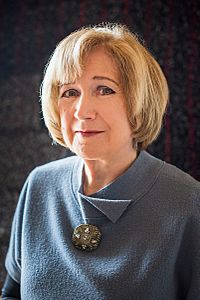Lídia Jorge facts for kids
Quick facts for kids
Lídia Jorge
|
|
|---|---|
 |
|
| Native name |
Lídia Guerreiro Jorge
|
| Born | 18 June 1946 Boliqueime, Loulé, Portugal |
| Nationality | Portuguese |
| Notable awards | Prémio Literário Município de Lisboa (1982, 1984) Prémio D. Dinis (1998) |
| Spouse | Carlos Albino Guerreiro |
| Website | |
| www.lidiajorge.com https://mertinwitt-litag.de |
|
Lídia Jorge, born on June 18, 1946, is a very important Portuguese writer. She is known for her novels and stories. Her work often shows a new style of Portuguese writing that came after a big change in Portugal.
Contents
About Lídia Jorge
Lídia Jorge grew up in a small village called Boliqueime in southern Portugal. Her family were farmers and some had moved to other countries. She studied languages at the University of Lisbon. After graduating, she became a teacher in high schools.
Her Time as a Teacher
Lídia Jorge spent some important years teaching in Angola and Mozambique. These were former Portuguese colonies. She was there during the last part of the Portuguese Colonial War. Most of her teaching career, however, was in Portugal. Later, she also taught at the University of Lisbon from 1995 to 1999.
Other Roles
Besides writing and teaching, Lídia Jorge also helped with important public groups. She was part of the Portuguese High Authority for Media. She also served on the General Council of the University of Algarve.
What Lídia Jorge Writes About
Lídia Jorge's books explore many interesting ideas. She often writes about:
- Portugal's past, including its time as a colony and when it had a dictatorship.
- What revolutions mean for people and countries.
- The differences between old ways of life and modern society.
- Fights and disagreements between different generations.
- Families breaking apart.
- The experiences and challenges faced by women.
- People moving from their home country to live somewhere else.
Her Stories on Screen and Stage
Many of Lídia Jorge's works have been turned into plays, movies, and TV shows.
Plays
Her play A Maçon was performed at a famous theater in Portugal in 1997. Another play, based on her book O Dia dos Prodígios, was also shown in Lisbon. More recently, her work Instruções para Voar was performed in theaters in Faro and Lisbon.
Movies and TV
Her novel A Costa dos Murmurios became a movie in 2004. A short story called Miss Beijo was made into a TV show for Portuguese television in 2021. Her book The Wind Whistling in the Cranes also became a movie.
Her Work Around the World
Lídia Jorge's novels are very popular and have been translated into many languages. Her books are read in over twenty languages, including English, French, German, and Spanish. They are studied in universities in Portugal and other countries.
University Honors
The University of Algarve gave her a special award, a Doctorate Honoris Causa, in 2010. This is a high honor given to people who have made great contributions. In 2020, a special magazine issue was dedicated to her work. In 2021, the University of Geneva in Switzerland started a special program called the "Lídia Jorge Chair" to study her writing. Another "Lídia Jorge Chair" was started at the University of Massachusetts UMass Amherst in 2022. In March 2024, a third "Lídia Jorge Chair" was opened at the Universidade Federal de Goiás in Brazil.
In December 2024, the University of Aveiro also gave Lídia Jorge a Doctorate Honoris Causa. They called her "probably the most international of contemporary Portuguese writers."
Awards and Recognitions
Lídia Jorge has received many important awards and honors for her writing and contributions.
Special Honors
On December 17, 2004, a library in Albufeira was named the Lídia Jorge Municipal Library in her honor. To celebrate 30 years since her book O Dia dos Prodígios was published, an exhibition about her life and books was held in Loulé from November 2010 to March 2011.
In Portugal, the President, Jorge Sampaio, gave her the Grand Cross of the Order of Infante D. Henrique in 2005. This is a very high honor. The President of France, Jacques Chirac, also honored her in 2005 with the Chevalier of the French Ordre des Arts et des Lettres. She was later promoted to Officer in 2015 and Commandeur in 2025.
In 2021, Lídia Jorge was chosen to be a member of the Portuguese Council of State by President Marcelo Rebelo de Sousa. This is an important group that advises the President.
She also writes regularly for newspapers like Jornal de Letras, Público, and El País.
Main Prizes
Lídia Jorge has won many literary prizes throughout her career. Some of these include:
- Malheiro Dias Prize (1981)
- Cidade de Lisboa Literary Prize (1982 and 1984) for O Cais das Merendas
- Dom Dinis Prize (1998) for O Vale da Paixão and Notícia da Cidade Silvestre
- P.E.N. Club Fiction Prize (1998) for O Vale da Paixão
- Jean Monnet European Literature Prize (2000) for O Vale da Paixão
- Portuguese Writers Association Prize (2002) for O Vento Assobiando nas Gruas
- International Albatroz Literature Prize (2006)
- Spanish-Portuguese Art and Culture Prize (2014)
- Vergílio Ferreira Prize (2015)
- FIL Award for Literature in Romance Languages (2020)
- Grand Prize for Chronicle (2021) for Em Todos os Sentido
- Portuguese Writers Association Prize (2022) for Misericórdia
- Prize Eduardo Lourenço (2023) for Misericórdia
- Prize Urbano Tavares Rodrigues (2023) for Misericórdia
- P.E.N. Club Narrative Prize (2023) for Misericórdia
- Prize Fernando Namora (2023 and 2024) for Misericórdia
- Prix Médicis étranger (2023) for Misericordia
See also
 In Spanish: Lídia Jorge para niños
In Spanish: Lídia Jorge para niños
 | Frances Mary Albrier |
 | Whitney Young |
 | Muhammad Ali |

